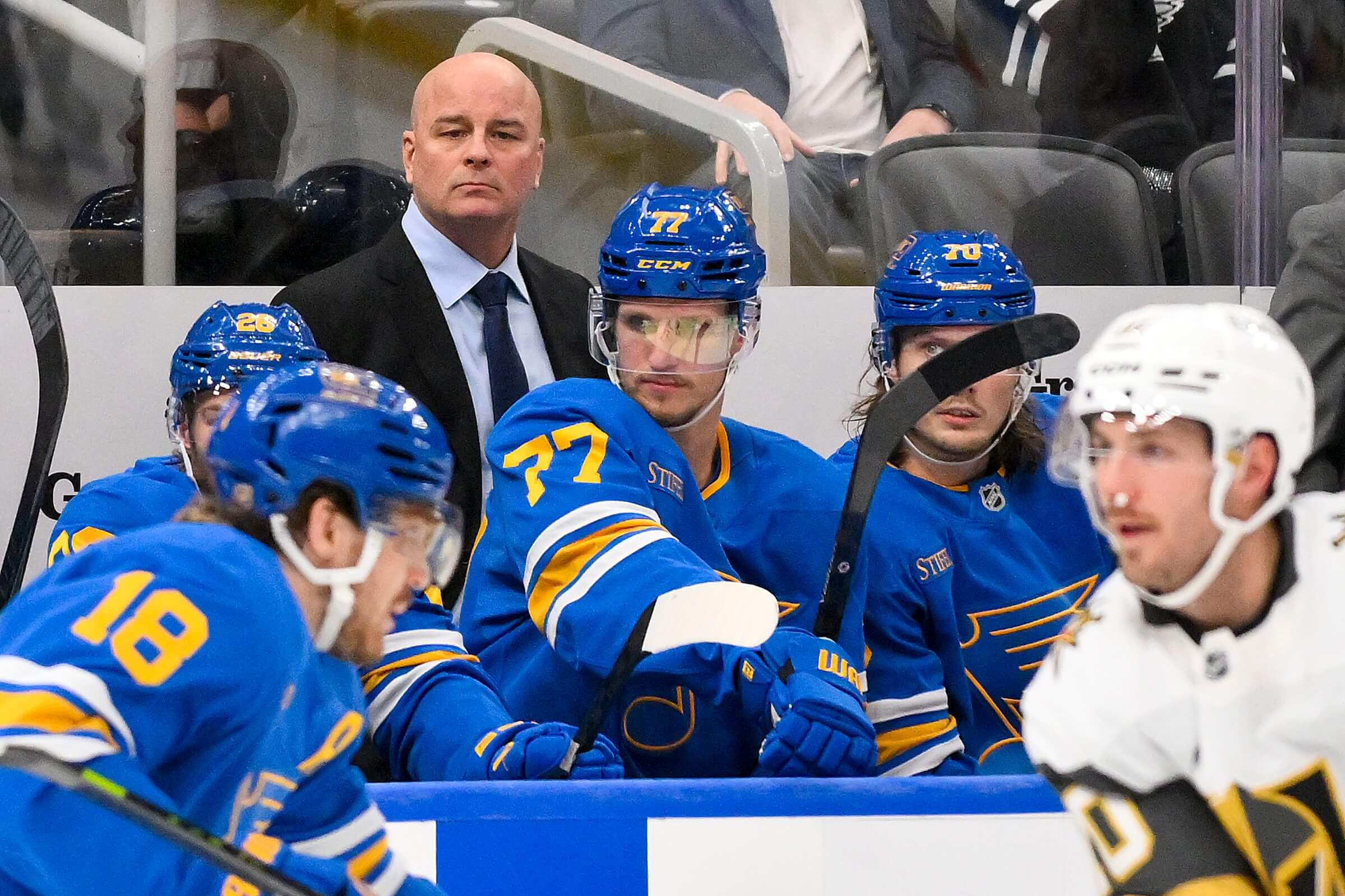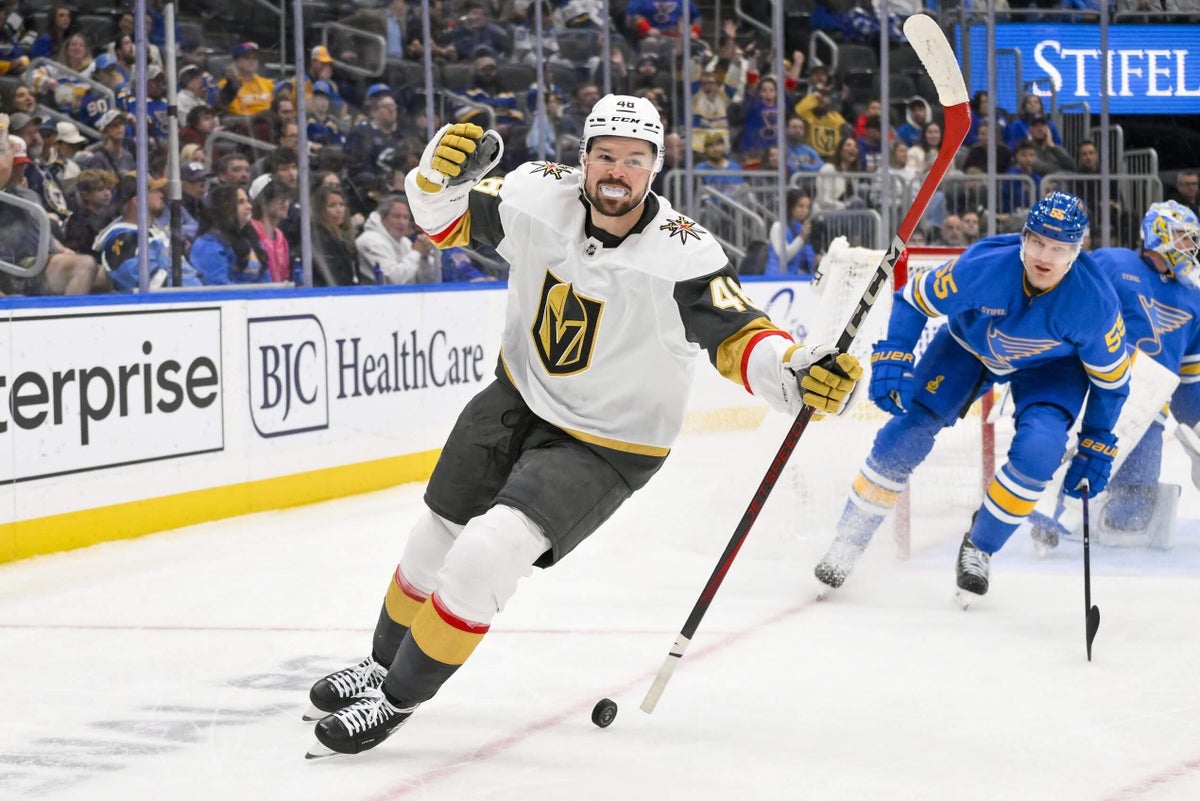ST. LOUIS — The St. Louis Blues just aren’t a good hockey team. They’ve had plenty of opportunity to prove otherwise and, other than sprinkling in a few points here and there, haven’t come close.
The latest examples came this weekend, beginning on Friday when they blew not one but two two-goal leads in a 6-5 shootout loss to the Philadelphia Flyers. Saturday, they went nearly 19 minutes without a shot on goal and would’ve been shut out if not for a late goal in a 4-1 loss to the Vegas Golden Knights.
This question comes up a lot: What’s wrong with the Blues?
Everything.
Slow starts. Bad second periods. Last-second losses.
The highest-paid players are not producing. The leaders are not leading. The coaches are not getting the most out of the players.
You can break down all the trends in an attempt to figure out what’s going on, and the conclusion you will come to is just not good.
The Blues have been retooling the past few seasons, but claimed they were out of it. They gave Pavel Buchnevich a new six-year, $48 million contract and added depth to the roster through free agency in Pius Suter and Nick Bjugstad. They believed they would compete for a playoff spot this season, and I believed it, too.
Instead, what the Blues have is a team at the NHL’s $95.5 million salary cap and tied for the second-fewest points in the league (16).
They’re not just losing games; they’re looking really bad doing it. Friday, the Blues opened a 5-3 lead on the Flyers five minutes into the third period, and five minutes later it was gone. A costly turnover, uncovered players in their defensive zone, outshot in overtime, etc.
Saturday, they had eight shots in the first 11 minutes and didn’t have another for 18:36. The Golden Knights went ahead 3-0 after more poor execution: turnovers, goals given up by the penalty kill, etc.
To make it worse, Brandon Saad, the former Blue who walked away from $5 million in guaranteed salary, scored his first goal of the season to give Vegas a 1-0 lead. Braeden Bowman, 22, scored his first NHL goal on the power play for a 2-0 lead. And after an entire intermission to reset themselves and put up a fight in the second period, the Blues gave up a goal to Noah Hanifin just 36 seconds in and the Golden Knights led 3-0.
Normally what’s said in the locker room after a loss like this qualifies as meaningless. However, when alternate captain Justin Faulk was asked about the game getting away from the team, his candid response was telling.
“We’re not playing with enough desperation, enough urgency. We need to correct that and we will.”
Justin Faulk, Brayden Schenn and Jim Montgomery after Saturday’s game against Vegas. #stlblues pic.twitter.com/2iml49ECpy
— St. Louis Blues (@StLouisBlues) November 16, 2025
“The life on the bench and within the group, to be honest there wasn’t a ton, and it kind of got drained after that (third goal),” Faulk said. “Ultimately, kind of played the game on autopilot, it seemed.”
A few moments later, Blues coach Jim Montgomery replied, “I don’t agree with that. I think we got flat and that’s where we need to have more from our group. There needs to be a better response.”
Autopilot? Flat? That’s probably splitting hairs.
They’re just not good.
Is it physical? Mental?
Both.
The Blues can’t play well enough to gain any confidence, and because they don’t have any confidence, they fall apart.
“When things don’t go our way, our work ethic suffers,” Montgomery said.
The coaches have conducted detailed practices, hammering away at the game-management issues that have plagued the team all season. There have been healthy scratches — that number is up to 10 of the 25 players who’ve spent time on the roster this season. There have been more line combinations than you can count.
None of it has created much positive.
The team could say it had points in five of six games heading into Saturday. However, four losses in that stretch — the egg in Washington, collapses against Seattle and Philadelphia, and the dud against Vegas — were debilitating.
Look at it this way: The Blues were embarrassed on Friday, giving up the two multi-goal leads. Then, less than 24 hours later, with a sellout crowd of 18,096 providing a more boisterous atmosphere than they perhaps deserve, they couldn’t so much as register a shot against a team in Vegas that was 0-2-2 in its last four games and surrendered 17 goals in that stretch.

Jim Montgomery’s Blues are tied for the second fewest points in the NHL. (Jeff Curry / Imagn Images)
What else can Montgomery do at this point?
“All I know in life is you just work,” he said. “You work and you watch film … you talk to your staff, you talk to your managers, you talk to your leaders and you keep working together and you come up with solutions.
“We might need to change the way we play in certain areas. We tried redefining and making sure that our habits and details are really good, and after a while, the definition of insanity is to keep doing the same thing and not getting good results. So we might need to try different things.”
Montgomery’s honesty is respectable, but 19 games into the season, which is essentially the quarter-point, the Blues are discussing being on “autopilot” and may have to “change the way we play.”
That should end all of the analysis about what’s ailing the Blues. They’re not good enough, and there are signs that they may be accepting of that, or that it’s creeping in.
Faulk was understandably denying that on Saturday, but he couldn’t explain why the desperation level has been so inconsistent.
“That’s a tough question to answer — don’t know, but it’s not where it needs to be,” he said.
So you’re screaming at the TV, or writing on social media that the Blues need to make Buchnevich a healthy scratch. He has just three points in his last 14 games and all three have been on the power play — not a single even-strength point since the Dallas game Oct. 18.
No one is going to argue with that, but what’s it going to solve? So he comes back with a chip on his shoulder and scores a goal, like Jordan Kyrou did in his return from a healthy scratch, and the Blues are no better than they were.
The Blues are broken, and it’s looking more and more like a lost season.
There appears to be a need for a massive change by general manager Doug Armstrong, but how would that impact the team’s future plan under incoming GM Alexander Steen? And how long will Armstrong and Steen have to wait this season until other clubs are ready to do business?
Those are the only questions that need to be asked now, because ‘what’s wrong with the Blues?’ should be officially moot.
No further examples are needed.
